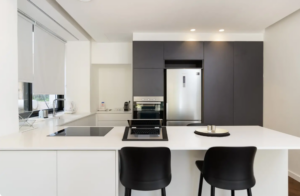In this article, we learn how much home renovations cost – and which repairs increase the home value, and which don’t. Understanding the differences helps homeowners to prepare for their construction projects. Here are 5 inside tips & tricks to keep in mind before starting your home renovation.
Tip 1: Know that every type of renovation affects the house value in a different way
 A house in poor condition in Amstelveen is for sale. The sellers have accepted Linda’s offer of € 500,000. In addition to the necessary repairs, Linda plans to build an upper floor and renovate the kitchen with luxury items. Her contractor estimates the whole project at € 200,000.
A house in poor condition in Amstelveen is for sale. The sellers have accepted Linda’s offer of € 500,000. In addition to the necessary repairs, Linda plans to build an upper floor and renovate the kitchen with luxury items. Her contractor estimates the whole project at € 200,000.
Linda’s buying agent has recommended a professional appraiser whom she can contact for an estimate of the value of the house for mortgage purposes. Taking into account the value of the home and the renovation costs, the appraiser has made two taxations – € 500,000 for the property’s current value and € 600,000 for after the planned project has been carried out. The total of the purchase price and project costs amounts to € 700,000. Yet, not all the work Linda plans to carry out will directly increase the home value. The bank determines the lending sum by looking at the property’s market value, and therefore, in this case, will grant Linda a mortgage of € 500,000 to buy the house, and a building loan (bouwdepot) of only € 100,000, representing the after-repairs value that the appraiser had estimated at € 600,000. This means that she will need to pay the remaining € 100,000 out-of-pocket.
Tip 2: Learn what increases your home value and what doesn’t
Understanding the impact of different repairs on the home value is essential for homeowners when planning a refurbishment. We have divided the improvements into two categories – repairs that directly increase the dwelling’s value and those that don’t (necessarily).
The Two Types of Repairs That Increase Home Value
a. Those that make it more sustainable
The most common way to determine the sustainability of a dwelling is by looking at its energy label. The higher the rate, the less energy a house consumes. Not only does this contribute to protecting the globe, it also saves you money every month in energy consumption.
Examples:
- Changing windows from a single-glazed to HR++
- Insulating the floors and walls
- Installing solar panels
- Replacing old appliances with energy-efficient ones.
b. Those that add more living space
Bigger homes sell for more money. Simply put, consider two almost-identical neighboring houses, whereby one is 85 m2 and the other 100m2. Which one is more likely to be worth more? The second one, of course.
Here are some ways to gain more living space. Consult your buying agent about the local zoning plans and Historic Preservation (Monumentenzorg) Regulations to find out the maximum potential you can get out of your house.
Examples:
- Installing a dormer in the attic
- Building a cellar
- Extending the living room
- Converting the shed into office space.
Some improvements do not necessarily increase the home value
 When planning to take out a renovation loan with the bank, it is crucial to understand that some tasks have a minor (or indirect) effect on the property value. Since banks see more value in elemental improvements than in cosmetic ones, they are less (or only partly) likely to finance these sorts of works.
When planning to take out a renovation loan with the bank, it is crucial to understand that some tasks have a minor (or indirect) effect on the property value. Since banks see more value in elemental improvements than in cosmetic ones, they are less (or only partly) likely to finance these sorts of works.
Examples:
- An excessively modern kitchen
- A luxury bathroom
- Expensive flooring
- Decorative ornaments.
Tip 3: Estimate the renovation project costs as accurately as possible
It is essential to decide first on the renovation standard when calculating the costs – because prices could differ vastly, depending on many variables. It could be tricky to estimate the eventual costs. For example, the difference in price between a low and high finish of a new bathroom could range from € 5,000 to € 30,000. In addition, consider a safety buffer for unexpected renovation expenses (see more below).
First use the general costs as a metric to estimate roughly whether a renovation is within your budget. Then, choose specific costs per repair work. Our contractors base the prices below on average standard items.
General costs for a home renovation project:
- Overall construction: € 850-1,800/m2
- General renovation: € 300-1,300/m2
- Craftsman rate: € 15-60/hour.
Specific costs for renovating your home in the Netherlands:
- Wall stucco work: € 10-25/m2
- Ceiling stucco work: € 15-30/m2
- Wall + ceiling paintwork: € 7-15/m2
- Bathroom: € 5,000-12,000
- Toilet: € 1,200
- Kitchen: € 8,000-17,000
- Double-glazed window: € 300-1,000
- Roof tiling: € 100-300/m2
- Dormer (dakkapel): € 3,500-8,500
- Façade renovation: € 15-50/m2
- Extension: € 14,000-19,000.
Tip 4: Take at least a 10% buffer on top of your renovation budget
Unexpected expenses, also known as miscellaneous expenses, refer to the costs a homebuyer might have overlooked while preparing the refurbishment plan. Think, for example, of situations such as a rotten wooden beam or asbestos-covered inside pipes – tasks that require an extra effort to fix. Moreover, consider other expenses that the contractor may have as a consequence of external factors, such as those in connection with the rental of a crane due to difficult access to certain areas, the removal of construction waste, or expensive parking. That’s why it is common to take into account a safety buffer of at least 10% on top of the estimated project costs.
Tip 5: Get a professional quotation from a contractor before launching the project
Before launching your renovation project, it is best to consult a professional contractor who will come to your property, take measurements, sketch a plan, and draw an extensive project plan to ensure the best completion of the renovation.
In Diagonal Renovations, we offer our clients an introductory interview with the contractors in order to obtain initial advice on their renovation plan.
Plan a visit at your place here!

Understanding Mortgage Calculators ...
Buying a home in the Netherlands involves careful financial planning, especially for expats navigating the ...

Mortgage Interest Rates in 2025: Wh ...
As 2025 unfolds, expats navigating the Dutch housing market find themselves in a shifting financial ...

Remodeling your house in the Nether ...
Have you just bought or rented a house that needs remodeling – but have no idea ...

How to safely use public wifi netwo ...
Public Wi-Fi networks come with a significant risk to the security of your personal ...

Be prepared for the Dutch housing m ...
Buying a house in the Netherlands may work a bit differently to what you are ...

The UnDutchables 9.0
Following the legendary previous eight editions of The UnDutchables, the 9th edition of this all ...

This is your checklist for moving t ...
Do you plan to move to Amsterdam or somewhere else in our beautiful country to ...

Making the most of your Dutch home
Whether you are renting, staying in a long-term AirBNB or have just bought a ...

Gift giving in the Netherlands-all ...
If you feel like skipping your birthday, you may be in for a challenge when ...

10 things you will find in every Du ...
The Dutch are very fond of houseplants, the more the merrier! You will find the ...
 Useful links
Useful links